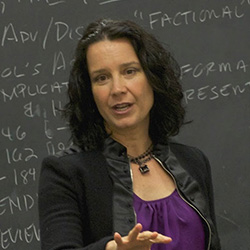
Stacy Alaimo is an internationally recognized scholar of American literature, ecocultural theory, environmental humanities, science studies, and gender theory. She received her PhD in English, along with a certificate in critical theory, from the University of Illinois in 1994. She has published three monographs: Undomesticated Ground: Recasting Nature as Feminist Space (Cornell University Press, 2000); Bodily Natures: Science, Environment, and the Material Self (Indiana University Press, 2010); and Exposed: Environmental Politics and Pleasures in Posthuman Times (University of Minnesota Press, 2016). Alaimo co-edited the stellar theory collection, Material Feminisms, with Susan J. Hekman (Indiana UP. 2008). She has also published widely on such subjects as environmental literature and film, environmental art and architecture, performance art, environmental pedagogy, gender and climate change, nonhuman sexual diversity, new materialism, and the science, art, and literature of the oceans. Her work has influenced the development of the fields of “material ecocriticism,” “material feminisms,” and the cross-disciplinary field of new materialist theory more broadly. Alaimo’s work forges connections across the divided realms of science, philosophy, literature, and popular culture. She is currently writing a book entitled, Blue Ecologies: Science, Aesthetics, and the Creatures of the Abyss, about the representation of sea creatures in science, art, literature, and popular culture.
Onto-epistemologies for the Anthropocene, or Who will be the Subject of the Posthumanities?
Abstract
Given the vast temporal and geographic scale of the Anthropocene, many figurations of the “anthropos” are abstracted and transcendent, ironically replicating the very colonizing and extractive epistemologies that have fuelled the degradation of peoples, animals, and ecologies. A new sense of the human, for a newly configured posthumanities, needs to be less singular, less discrete, less lofty. Rather than removing humans from the scene, environmental epistemologies need to think the human as transcorporeal – immersed within emergent worlds, differentially vulnerable and culpable. Such onto-epistemologies could be fostered by a shift from the humanities proper to the posthumanities, which would include feminist science studies, new materialism, and multispecies speculations. Even as planetary environmental concerns require global visions, the practice of scale shifting, as well as the enticements of aesthetics and sensuality, can ground posthuman onto-epistemologies in immediate, though profoundly mediated, modes of knowing and being.
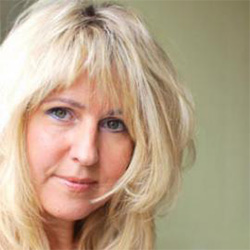
Ewa Domanska is a professor of human sciences at the Department of History, Adam Mickiewicz University in Poznan, Poland and a regular visiting associate professor at the Department of Anthropology, Stanford University. Her teaching and research interests include theory and history of historiography, comparative theory of the human and social sciences, ecological humanities, genocide and ecocide studies, dead body studies. She is the author and editor of 20 books and numerous articles and essays published internationally in several different languages. Her more recent publications include: Necros: An Introduction to the Ontology of Human Dead Body and Remains (in Polish, 2017); “Animal History”, History and Theory, vol. 56, no. 2, 2017: 265-285; “The Eco-Ecumene and Multispecies History: The Case of Abandoned Protestant Cemeteries in Poland,” in Multispecies Archaeology, ed. by Suzanne E. Pilaar Birch. New York: Routledge, 2018: 118-132; “Posthumanist History”, in Debating New Approaches to History, ed. by Marek Tamm and Peter Burke. London, Oxford: Bloomsbury, 2018: 327-352.
Unbecoming human: Merging humanities and soil science
Abstract:
In this talk I attempt to show how certain insights coming from soil science might have a profound effect on humanistic understanding of the human and might ultimately help us form a more holistic and complementary approach to what it means to be human. I argue that research on cemetery soils (necrosols) and environmental history of the grave help to understand processes of dehumanization and the biological un-becoming of a human being, and conceptualize the transformation of the body as a result of processes which I call necrotic metamorphosis. In my talk I describe one possible manifestation of natural metamorphosis – humification and mineralization (becoming humus as a result of the natural process of the decomposition of bodies in soil). I adopt the futurists’ thesis that in the future we could face the emergence of various new species, including some created by humans. Thus humus constitutes a specific figuration of the post-human personhood.
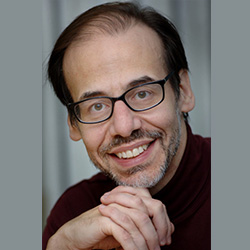
Steve Fuller is an American philosopher-sociologist in the field of science and technology studies. He has published in the areas of social epistemology, academic freedom, and the subjects of intelligent design and transhumanism. He graduated from Columbia University before gaining an M.Phil. from Cambridge and PhD from Pittsburgh, both in History and Philosophy of Science. He currently holds the Auguste Comte Chair in Social Epistemology at the University of Warwick. He is a Fellow of the UK Academy of Social Sciences and the European Academy of Sciences and Arts. He is also a Senior Research Fellow at the Breakthrough Institute, the leading ‘ecomodernist’ think-tank and an Affiliate Scholar at the Institute for Ethics and Emerging Technologies, the leading ‘transhumanist’ think-tank. His major areas of research are the future of the university and critical intellectuals, the emergence of intellectual property in the information society, the interdisciplinary challenges in the natural and social sciences, the political and epistemological consequences of the new biology, science and religion, the future of humanity. Along with 21 books, Fuller has written 65 book chapters, 155 academic articles and many minor pieces. Much of his recent work focuses on questions around technological enhancements and how they can improve the capacities of human beings. His more recent book publications include: Humanity 2.0: What it Means to Be Human (Palgrave Macmillan, 2011); Preparing for Life in Humanity 2.0 (Palgrave Macmillan, 2013), The Proactionary Imperative: A Foundation for Transhumanism (with Veronika Lipinska, Palgrave Macmillan, 2014), Knowledge: The Philosophical Quest in History (Routledge, 2015) and Post-Truth: Knowledge as a Power Game (Anthem, 2018).
The fork on the road for Humanity 2.0
Abstract:
What has distinguished my work from others who have thought about the future of humanity, is that I have focused on what the analytic philosopher Nelson Goodman called the ‘projectible past’, that is, the most salient features of human history when it comes making sense of our collective future. ‘Posthumanism’ and ‘transhumanism’ offer two quite different strategies for addressing this issue. Posthumanism, which focuses mainly displacing the human as the locus of value in the world, regards humans as no more than members of Homo sapiens, which is to say, upright apes – and all the earthbound material resource needs associated with such creatures. In this context, the period in geological time nowadays called the ‘Anthropocene’ is clearly relevant to humanity’s future in this sense. Unsurprisingly perhaps, this turns out be rather limited and pessimistic, especially if such humans continue to function as they have. However, transhumanism would not have humanity’s bio-evolutionary inheritance weigh so heavily on our future. In fact, it may simply have been a cosmic accident that we emerged from upright apes, given the possibilities on the horizon for us both to enhance our default bodies and to morph with – if not migrate to – machines. In addition, humanity’s supposed earthbound nature is also open to review, given the prospects for space travel. I shall compare the two positions along various dimensions, basically arguing that ‘posthumanism’ is the new ‘conservatism’ and ‘transhumanism’ is the new ‘liberalism’.
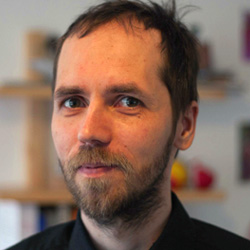
Zoltán Boldizsár Simon is a research associate at Bielefeld University and a board member of the Centre for Theories in Historical Research (Zentrum für Theorien in der historischen Forschung). He has written extensively on the theory and philosophy of history and on the challenge posed by technology and the Anthropocene to modern historical thinking in the journals History and Theory, The Anthropocene Review, History of the Human Sciences, Rethinking History, European Review of History, the Journal of the Philosophy of History, and the Journal of Social History. His recent publications include “Why the Anthropocene Has No History: Facing the Unprecedented,” The Anthropocene Review 4:3 (2017), 239–245; “(The Impossibility of) Acting upon a Story That We Can Believe,” Rethinking History 22:1 (2018), 105–125; “History Begins in the Future: On Historical Sensibility in the Age of Technology,” in S. Helgesson and J. Svenungsson (eds.), The Ethos of History: Time and Responsibility (Berghahn, 2018), “The Story of Humanity and the Challenge of Posthumanity”, History of the Human Sciences (2018). His new monograph, History in Times of Unprecedented Change: A Theory for the 21st Century, will be published by Bloomsbury in June 2019.
Two cultures of the posthuman future
Abstract:
The ongoing redefinition of the human in light of a posthuman future seems to take two distinct routes due to two distinct notions of the posthuman. The humanities approach grew out of a philosophical critique of humanism and labels itself as critical posthumanism. Its notion of the posthuman is a better human being through the achievement of a postanthropocentric subjectivity in a vision of ecotopia and species kinship. The latter approach – in debates on transhumanism, artificial intelligence, biotechnology, etc. – is best called technological posthumanity. Its notion of the posthuman refers to better-than-human beings (better in the sense of outperforming human capacities), that is, beings literally post-human and even more exceptional than humanism could have ever imagined human exceptionality. Although the concerns of the two approaches overlap to a large extent, they tend towards developing two cultures. Even the most conscious warning to avoid such a scenario comes from an approach (Rosi Braidotti’s critical posthumanism) that is the most strongly invested in championing its own culture. In the talk, I address the diverging imperatives of the two cultures of the posthuman future, with special attention paid to their conflicting ideas of historical change. I argue that the unfortunate situation in which two cultures advocate particular agendas concerning the entirety of planetary life is the biggest obstacle to creating a new knowledge economy that could stand a chance even to attempt to comprehend the complexity of challenges posed by technological and ecological changes.
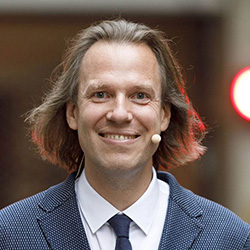
Stefan Lorenz Sorgner teaches philosophy at John Cabot University in Rome and is director and co-founder of the Beyond Humanism Network, Fellow at the Institute for Ethics and Emerging Technologies (IEET), Research Fellow at the Ewha Institute for the Humanities at Ewha Womans University in Seoul, and Visting Fellow at the Ethics Centre of the Friedrich-Schiller-University in Jena. He studied philosophy at King’s College/University of London (BA), the University of Durham (MA by thesis), the University of Giessen and the University of Jena (Dr. phil.). In recent years, he taught at the Universities of Jena (Germany), Erfurt (Germany), Klagenfurt (Austria) Ewha Womans University in Seoul (South Korea) and Erlangen-Nürnberg (Germany). His main fields of research are Nietzsche, the philosophy of music, bioethics and meta-, post- and transhumanism. His main publications include: Metaphysics without Truth: On the Importance of Consistency within Nietzsche’s Philosophy. (2., rev. edn, University of Marquette Press, 2007), Human-Biotechnology as Social Challenge (ed. with N. Knoepffler, and D. Schipanski, Ashgate, 2007), Menschenwürde nach Nietzsche: Die Geschichte eines Begriffs (WBG, 2010), Post- and Transhumanism: An Introduction (ed. with R. Ranisch, Peter Lang, 2014), Transhumanismus: “Die gefährlichste Idee der Welt”!? (Herder, 2016), From Humanism to Meta-, Post- and Transhumanism? (ed. with I. Deretić, Peter Lang, 2016), and Ethics of Emerging Technologies: From Educating the Young to Engineering Posthumans. (ed. with M. Sinaci, Trivent Publishing, 2018).
A posthuman future of the humanities
Abstract:
Emergent technologies represent a fundamental challenge to all aspects of our lifeworld. This has also enormous implications for the humanities. For being educated, it is no longer sufficient to just study the longstanding humanist tradition. The latest technological developments as well as post- and transhumanism also need to be considered for a comprehensive understanding of the world we live in. This is what is being done in the emergent field of Posthuman Studies. Here, reflections concerning the impact of emergent technologies in the lifeworld are being dealt with. However, to being able to grasp all the implications of emergent technologies, a direct awareness of what digital data can do and how it can be applied is essential, too, i.e. Digital Literacy is needed. Having acquired digital literacy the possibilities for investigations in the humanities also gets altered. Using digital technologies within the humanities becomes an option. Consequently, Digital Humanities need to be taught as an additional methodology within the humanities. In the Age of the Fourth Industrial Revolution, humanities students need to be able reflect upon the impacts of emergent technologies (Posthuman Studies), need to know what digital technologies can do (Digital Literacy), and need to be able to include new technologies within their research (Digital Humanities). The inclusion of these disciplines into the humanities could be referred to as metahumanities, as it goes beyond the humanities, but it is also inclusive concerning the reflections on the latest emerging developments. Meta means both beyond as well as in between, so that the term can capture both elements in an appropriate manner.
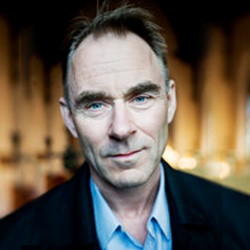
Sverker Sörlin is a Swedish historian of ideas, professor of environmental history at the Division of History of Science, Technology and Environment at the Royal Institute of Technology (KTH) in Stockholm. Sörlin has a PhD in the history of ideas from Umeå University from 1988. In 1993 he assumed the first chair in environmental history in Scandinavia, also at Umeå University. He has had an adjunct position at the Stockholm Resilience Centre (2005–2012), and visiting positions at University of California Berkeley (1993), University of Cambridge (2004–2005), University of Oslo (2006), University of Cape Town (2012–2013), and the Institute for Advanced Study, Princeton University (2013–2014). In 2011 he was awarded an honorary doctorate by University of Turku. Sörlin has published in the fields of history of science, environmental history, the history of forestry, human ecology, environmental humanities, European history, research policy, innovations studies, and the history and politics of higher education. Among his recent book publications are: Science, Geopolitics and Culture in the Polar Region (Ashgate, 2013), The Future of Nature: Documents of Global Change, ed. with Libby Robin and Paul Warde (Yale UP, 2013), Northscapes: History, Technology, and the Making of Northern Environments, ed. with Dolly Jørgensen (UBC Press, 2014) and The Environment: A History, with Libby Robin and Paul Warde (Johns Hopkins UP, 2018).
Making sense of the environmental humanities: Emerging histories of the human-earth relationship
Abstract:
The Environmental Humanities is a field that has grown alongside with the great interest in the Anthropocene. In my contribution I wish to examine this relationship. What is it that is attracting scholars and students in the humanities to some of the largest questions and challenges? Historiographically there is a trend to go beyond the usual scales of the human and conventional intentional actions, toward more-than-human registers, animals, deep time, the ‘vertical turn’ from the ocean floor to the atmosphere and outer space. In one word: the planetary. I will comment on concepts that have been important (Biosphere, Cryosphere, Environment, Anthropocene, Climate, etc.) and on concepts that relate to managing these relationships (Global Environmental Governance, Earth Systems Science, Planetary Boundaries, Environing Technologies, etc.). I will also test the idea that we can indeed talk about an emerging new Weltanschauung, with profound implications for how we think historically and organize the humanities.
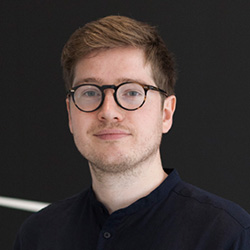
Timotheus Vermeulen is associate professor in media, culture and society and coordinator of the PHD programme in Media and Communication at the University of Oslo. His research interests include cultural theory, aesthetics, and the close textual analysis of film, television and contemporary art. Vermeulen is the author of the monograph Scenes from the Suburbs (EUP, 2014) and joint editor with Martin Dines of New Suburban Stories (Bloomsbury, 2013). Together with Alison Gibbons and Robin van den Akker he further edited Metamodernism: Historicity, Affect and Depth after Postmodernism (Rowman & Littlefield, 2017). “Notes on Metamodernism”, an essay he co-wrote with Van den Akker, was translated and published in book form in Germany as Anmerkungen zur Metamoderne (Textem, 2016). Vermeulen further founded and helped maintain the now defunct arts and culture platform Notes on Metamodernism. He has published across academic and popular journals alike, writing for amongst others The Journal of Aesthetics and Culture, Screen, Film-Philosophy, Monu, The American Book Review, E-Flux Journal, Texte Zur Kunst, as well as various reference works, collections and catalogues. He is a regular contributor to Frieze. Vermeulen has served on numerous committees and juries for art prizes, most recently the Nam Jun Paik Award and the Bonner Kunstpreis. He also advises and consults on exhibitions. He is currently working on a project on the modality of the “as-if” in contemporary art.
Metamodernism and posthumanism
Abstract:
In this lecture I discuss posthumanism and by extension the posthumanities – as a discourse – in the context of the cultural dominant, or, in Raymond Williams’ words, “dominant structure of feeling”, of metamodernism. I suggest that our concern with the posthuman is not so much a consequence of a particular technological invention, a specific political-economic development or even environmental change, but a quality of a related yet distinct affective register that filters our every encounter with our immediate and indirect life-worlds – the metamodern. I will focus in particular on three tropes that are recurrent in the arts: the altergorithm; the new depthiness; and sentimental abstraction.
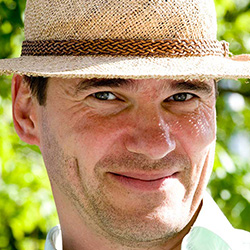
Thomas Schwarz Wentzer is a Danish philosopher, with a specialization in phenomenology and philosophical hermeneutics. He is the associate professor at, and head of, the Department of Philosophy and History of Ideas in Aarhus University. In 2011–2015 he led the research project “Existential Anthropology: Inquiring Human Responsiveness” (funded by the Danish Research Council) which resulted in a series of international interdisciplinary conferences, e.g. Moral Engines: Exploring the moral drives in human life (2014), The Responsive Community: A Conference in Existential Anthropology (2015), and Place, Commonality, and the Human: Towards a New Philosophical Anthropology (2016). He has published widely on Hegel, Heidegger, Benjamin, Gadamer and the phenomenological tradition. His recent publications include two coedited volumes on philosophical anthropology: Finite but Unbounded: New Approaches in Philosophical Anthropology (De Gruyter, 2017) and Moral Engines: Exploring the Ethical Drives in Human Life (Berghahn Books, 2018).
We humans. Who is the Anthropos in ‘Anthropocene’?
Abstract:
The proclamation of the Anthropocene calls the human into question. Yet the philosophical responses to the Anthropocene have largely been dismissive of the category of the Anthropos. This seems reasonable, as the current situation of the globe arguably is caused by anthropocentric metaphysics in its various guises. – And yet: the proclamation of the Anthropocene implies a normative appeal directed at the subject that it speaks about. If our age in geohistorical terms has to be understood as the age of humankind, we have to ask ourselves what and who are. – Drawing on thinkers such as Martin Heidegger, Jean-Luc Nancy, Bernhard Waldenfels and Dipesh Chakrabarty, I will argue for the inevitability of putting the human centre stage. The Anthropocene declares humankind to be responsible – the lecture will try to make sense of this outrageous sentence.